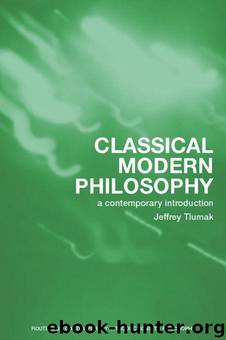Classical Modern Philosophy: A Contemporary Introduction (Routledge Contemporary Introductions to Philosophy) by Tlumak Jeffrey

Author:Tlumak, Jeffrey [Tlumak, Jeffrey]
Language: eng
Format: epub
ISBN: 9781134475612
Publisher: Taylor and Francis
Published: 2013-01-10T16:00:00+00:00
1B Ideas constantly change.
2B There is no change without a cause.
3B Something causes ideas to change. (1, 2)
4B Qualities, ideas, combinations of ideas, and substances are all the possible causes.
5B Qualities are not (the) causes (since qualities either are or are represented by ideas – each rejected in virtue of 3A and 5A respectively).
6B Ideas are not causes. (3A)
7B Combinations of ideas are not causes (if ideas aren’t, combinations aren’t).
8B There is some substance(s) that causes ideas to change (the other possible explanations have been ruled out). (1–7)
9B There is no material substance (previously shown).
10B There is a spiritual substance that causes ideas to change. (8, 9, and the fact that there are no other candidate kinds of substances besides material and spiritual)
11B God exists. (10, and the fact that no finite substance will suffice)
What do you think about this argument? Whatever its cogency, its existence suggests an answer to a main question I raised at the start. His epistemology is empiricist. But are there two or three cornerstones to Berkeley’s metaphysics? Two surely are nominalism and idealism. Is theism the third? It seems not. Although Berkeley is a devout theist, indeed became a bishop, whatever he may also believe on faith, it seems that he aims to derive theism from empiricism, nominalism and idealism. On the other hand, once God is in the picture, he plays an enormous role. To highlight one final interpretive controversy, some think God vitally provides the basis for fully understanding what real, sensible things are (not just how to distinguish them from imaginary things in terms of vividness, coherence, and involuntariness): they are signs in the language of God, the way he benevolently communicates directly with us. The materialists distance us from God with their useless, intermediate mechanism. Idealism makes manifest how gratifyingly close we are to God.
Indeed, though I do not find it fully elaborated in our two famous texts, elsewhere Berkeley seems to use an argument from nature as language to support belief in God’s existence. Its thrust is that I’m rightly convinced by analogy with my own case that other persons exist by the fact that they speak to me, since I know that my creative capacities for language-use signify the existence of my own mind. (Recall Descartes’ similar appeal in Part V of his Discourse on Method.) But (and this comes mainly from Berkeley’s New Theory of Vision) vision itself is language, a set of arbitrary signs which nevertheless have meaning. But obviously we humans did not construct those signs which constitute the language of vision. So there is some greater mind that communicates with us about the order of nature and future events, the kind of crucial information vision provides. In sum, the same reason we have to believe in other human minds shows that divine mind, God, exists.
Finally, notice how Berkeley’s God purports not to be the more abstract, distant God that true believers such as Pascal and Pope John Paul II complained Descartes had perniciously wrought. In
Download
This site does not store any files on its server. We only index and link to content provided by other sites. Please contact the content providers to delete copyright contents if any and email us, we'll remove relevant links or contents immediately.
The remains of the day by Kazuo Ishiguro(8969)
Tools of Titans by Timothy Ferriss(8363)
Giovanni's Room by James Baldwin(7322)
The Black Swan by Nassim Nicholas Taleb(7105)
Inner Engineering: A Yogi's Guide to Joy by Sadhguru(6785)
The Way of Zen by Alan W. Watts(6600)
Asking the Right Questions: A Guide to Critical Thinking by M. Neil Browne & Stuart M. Keeley(5757)
The Power of Now: A Guide to Spiritual Enlightenment by Eckhart Tolle(5747)
The Six Wives Of Henry VIII (WOMEN IN HISTORY) by Fraser Antonia(5496)
Astrophysics for People in a Hurry by Neil DeGrasse Tyson(5181)
Housekeeping by Marilynne Robinson(4436)
12 Rules for Life by Jordan B. Peterson(4299)
Double Down (Diary of a Wimpy Kid Book 11) by Jeff Kinney(4260)
The Ethical Slut by Janet W. Hardy(4241)
Ikigai by Héctor García & Francesc Miralles(4240)
Skin in the Game by Nassim Nicholas Taleb(4235)
The Art of Happiness by The Dalai Lama(4125)
Skin in the Game: Hidden Asymmetries in Daily Life by Nassim Nicholas Taleb(3987)
Walking by Henry David Thoreau(3952)
